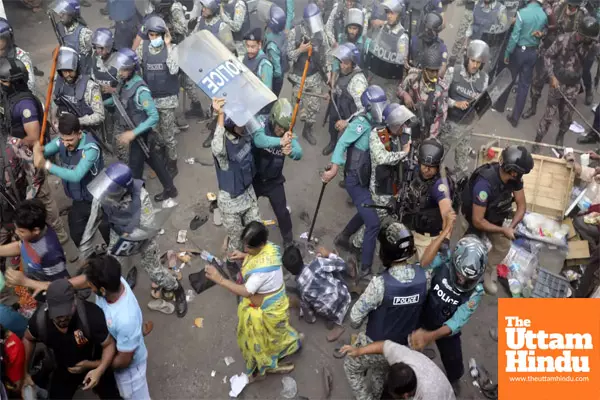

New Delhi(The Uttam Hindu):Bangladesh’s political landscape has plunged into turmoil following the arrest of Chinmoy Krishna Das Brahmachari, a prominent Hindu leader and spokesperson for the Bangladesh Sammilita Sanatani Jagran Jote. Das was detained on sedition charges at Dhaka’s Hazrat Shahjalal International Airport on Monday while en route to a rally in Chattogram. His arrest has led to widespread protests, with 30 individuals detained during clashes between his supporters and security forces in Chattogram.
Protest and arrest details
Das, known for advocating the safety and rights of religious minorities, faces charges of sedition. According to the police, he allegedly incited unrest through his activities. Clashes erupted following his detention, leading to the death of an assistant public prosecutor and significant unrest.
Rising concerns for minorities
Former Foreign Minister Hasan Mahmud described the situation in Bangladesh as "alarming" during a telephonic interview from an undisclosed location. He criticized the interim government led by Muhammad Yunus for allowing extremist elements to operate unchecked, fostering violence against Hindus and other minorities. Mahmud claimed that extremist groups such as Bangladesh Jamaat-e-Islami have gained traction, fueling anti-India rhetoric and jeopardizing secular principles.
India's reaction and international implications
India’s Ministry of External Affairs (MEA) expressed “deep concern” over Das’s arrest and the broader threats to religious minorities. The MEA highlighted multiple documented cases of violence, including arson, vandalism, and desecration of temples, criticizing the lack of action against perpetrators while a peaceful leader like Das faces sedition charges.
Pattern of violence
Attacks on Hindu temples and religious sites have reportedly become frequent since the fall of Sheikh Hasina’s government in August. Mahmud linked the uptick in violence to increased anti-India sentiment and claimed these events reflect broader extremist agendas. The former minister also accused Pakistan of influencing unrest through its Dhaka embassy.
Historical and political backdrop
Hindus constituted 22% of Bangladesh’s population during the 1971 Liberation War but now represent just 8% due to decades of violence and marginalization. Mahmud warned that some forces are exploiting the instability to push Bangladesh toward becoming a "second Afghanistan," threatening its secular fabric.
Hope for international intervention
Mahmud urged the new U.S. administration under Donald Trump to advocate for free and fair elections in Bangladesh. He expressed optimism that such efforts could restore stability and protect religious minorities.
Government's response
Muhammad Yunus, the interim head of government, dismissed claims of rising minority violence as politically motivated, arguing that the incidents are exaggerated. However, critics, including Mahmud, counter that these remarks trivialize the real and growing threats faced by minorities, urging decisive action to safeguard the secular identity of Bangladesh.
This situation highlights the deepening crisis for Bangladesh’s minorities amid rising extremism, political instability, and international concern.

